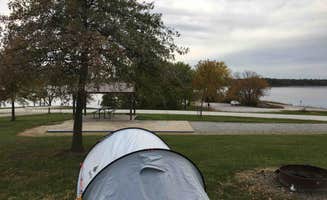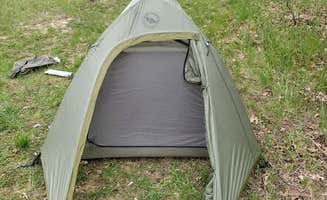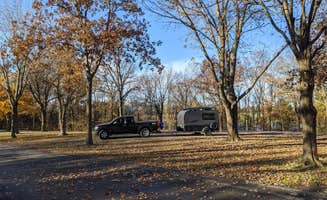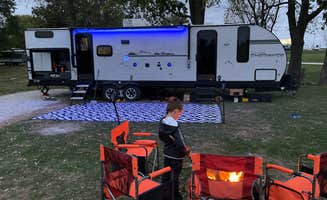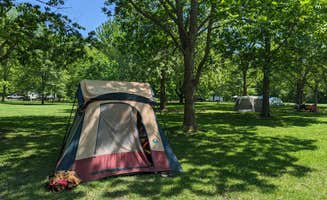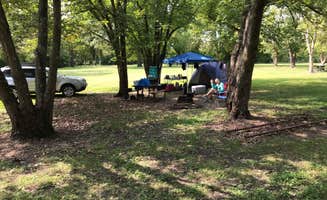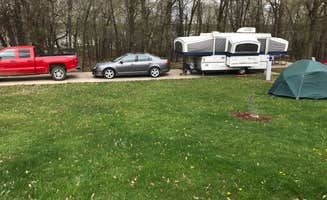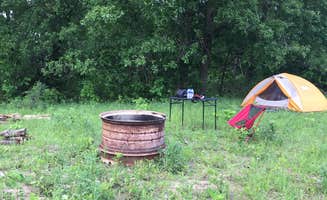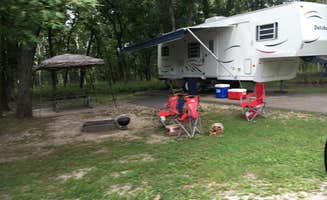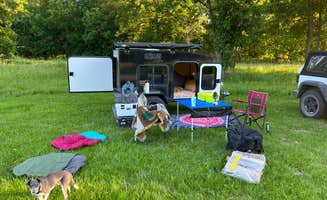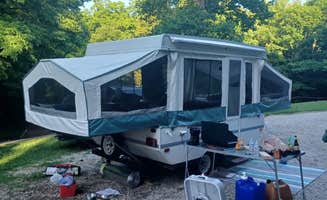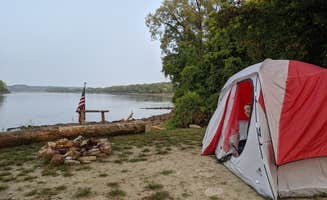Campgrounds near Salisbury, Missouri range from primitive conservation areas to developed state parks within reasonable driving distance. The region's topography features rolling hills with elevation changes between 650-900 feet above sea level. Most camping areas sit adjacent to lakes or rivers formed through both natural watersheds and man-made reservoirs, creating varied shoreline camping opportunities with summer humidity levels typically reaching 70-85%.
What to do
Fishing at multiple lakes: Thomas Hill Reservoir Conservation Area offers free lakeside camping with easy water access. "Great free camping but i left my rv there for two nights and it was broken into and ransacked. They stole numerous items," warns one camper about security concerns at Thomas Hill Reservoir Conservation Area.
Hiking historic trails: Arrow Rock State Historic Site features trails through historically significant areas. "There is a historic town you can tour for free that is within walking distance from the campsites," notes a visitor who adds, "We lived it so much, we went and bought a couple of bicycles to putter around the area. Clean and quiet."
Horseback riding trails: Rudolf Bennitt Conservation Area maintains equestrian-friendly camping areas and trails. "There are several equestrian campsites +20 throughout the park. Also a shooting range centrally located in the park," explains one camper at Rudolf Bennitt Conservation Area.
Kayaking and canoeing: The region's lakes provide calm paddling opportunities. "Area had car camping sites with covered shelters and picnic tables right by the water and some more primitive sites further from the water. Access is easy peasy," reports a visitor about Thomas Hill Reservoir.
What campers like
Budget-friendly options: Free and low-cost camping areas appeal to many visitors. "This is my favorite free camp ground. No showers or electric sites, however, the grounds are well kept, its quiet and has an awsome lake. Picknick table and fire ring at each site on lower loop," shares an enthusiast about Thomas Hill.
Historical attractions: The town of Arrow Rock draws history buffs. "The campground is neat and tidy and well maintained. The main appeal is the nearby town of Arrow Rock with its many historic buildings and an excellent interpretation center. Great for a pleasant cycle in the evening or a stroll after a bottle of wine," notes a visitor at Arrow Rock State Historic Site Campground.
Wildlife viewing: The region supports diverse wildlife observation opportunities. "Talking with the park ranger, this park does fill on up quickly and reservation are recommended," mentions a camper about Long Branch State Park, adding, "There are several hiking trails, from a prairie hike to a forest hike."
Secluded camping areas: Conservation areas provide more solitude than developed campgrounds. "Had a great stealth camping experience here. Road was gravelled all the way down and opened up to a big gravel lot. Had no issues and didn't see or hear anyone else!" shares a camper at Mussel Fork Conservation Area.
What you should know
Site spacing varies significantly: Some campgrounds offer roomier sites than others. "The ones on the inside of the circle have more space and are more open but you don't have any privacy. Most spots on the outside of the circle, especially on the north and west sides have more privacy but not as much space," explains a camper at Van Meter State Park Campground.
Cell service limitations: Connectivity varies dramatically across the region. "No cell phone service really," notes a camper at Arrow Rock State Historic Site, while another mentions, "No bath house until April 1 and no cell coverage (T-Mobile)."
Reservation challenges: Some areas lack clear systems. "Went to set up camp for the MR340 and it was very confusing on where the tent sites were. They have 6 RV sites at the top of the hill and 12 more river side. They say they have 10 tent sites hillside but not posts or map or anything that show its for tents," complains a visitor at Stump Island Park.
Insect activity: Proximity to water means bugs are prevalent. "Clean, well cared for campground. Bring plenty of bug spray. The campground is right by a marsh and it is REALLY buggy," cautions a visitor about Van Meter State Park.
Tips for camping with families
Beach access options: Several parks feature swimming beaches ideal for children. "I reserved a walk in site and it was totally worth it. The site is right on the water with beach access so there's no need to drive to the crowded beach area to swim!" shares an enthusiast at Long Branch State Park Campground.
Playground facilities: Some campgrounds include play equipment for younger visitors. "It had a nice playground for small kids including a little play area and some swing sets," notes a visitor at Van Meter State Park.
Family-friendly fishing: Multiple lakes offer accessible fishing opportunities. "The marina is very nicely set up for handicapped accessible fishing from the fishing dock," explains a visitor about Long Branch State Park.
Educational opportunities: Some parks feature interpretive centers. "The visitors center has some great information and interesting displays about American Indian heritage," mentions a camper describing Van Meter State Park.
Tips from RVers
Leveling requirements: Site conditions vary across parks. "Most sites looked level, but some are a bit wacky. We had a wacky one, and the host was nice, and quick to reposition us to a better spot," explains an RVer at Finger Lakes State Park Campground.
Hookup clarity: Verify hookup types before arrival. "If your camper has everything you need, it's a good campground. The website says it's 50 amp only, but it has 30 too," corrects a visitor about Stump Island Park.
RV site conditions: Surface types affect the camping experience. "The camp grounds are not overly private and are not in the best of shape (ground is really uneven)," notes a visitor about Finger Lakes State Park.
Shower availability: Amenities vary by season. "Passing through the area, and just needed a place for the night, so we came here. There is a beautiful lake, very spacious campsites. We just have a 30 amp Svc no water or sewer available yet," shares an RVer at Long Branch State Park.


